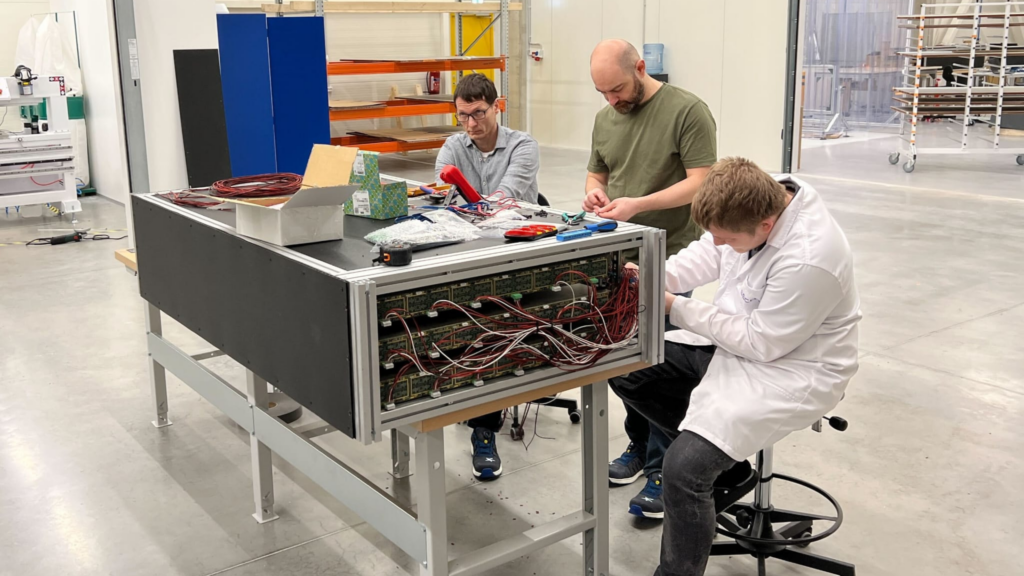19.06.2023
100,000 euros of investment in a drone monitoring system, waste transport, building scanning and sea buoys

The Tallinnovation competition for innovation organised by Tehnopol and the city of Tallinn received a record 25 applications this year. The jury chose four companies from among them that will receive a total of 100,000 euros to help bring their solutions into the urban space.
Deputy Major of Tallinn and chair of the jury Joosep Vimm commended the projects submitted for their high quality. “I am pleased that these four projects that were finally chosen are genuinely forward-looking and quite different from one another. All the projects that were chosen have the potential to help make our environment cleaner and to make the city smarter technologically. We wish all of them success and we hope that we will soon see the solutions in much wider use as a result of the pilot project”, he said.
The winning companies that were chosen were TrackDeep, Ibiot/Cleanhand, and GScan, which each received 30,000 euros, and WiseParker, which got 10,000 euros. Other entrants in the competition that presented their solutions in the final round were SpeakTX, Rexplorer, Grab2Go, ACM Metal, Traffest, Elmo Remote, Edumus Education, Sustinere and Eleport.
The Tallinnovation Competition was being held jointly for the fourth time by the city of Tallinn and the Tehnopol Science and Business Park. The CEO of Tehnopol Indrek Orav said that there were a lot of innovative solutions entered in the competition this year that will make the city space smarter. “This is now the tenth time that we have offered companies our urban testing site, and this helps us to learn what support and environment companies really need. Companies can run the tests with us in a safe place that aims to find out what services people will need in the future to make their lives in the city better and more sustainable”, he said. He explained that Tallinnovation is a good platform for developing the concept of the testing town and is of great value for companies that need a place to run tests and that need capital support.
From monitoring drones to scanning buildings
TrackDeep plans to test a system of sensors needed for identifying the position and movement vector of unmanned aerial vehicles in the urban space of Tallinn. The project aims to run tests to find the best plan for installing the infrastructure of sensors to create the U-space area where drones can fly in Tallinn. The company received 30,000 euros to develop its solution.
Chief Strategy Officer (CSO) at TrackDeep Kaido Lainjärv said that they entered the competition primarily to be able to work closely with the city.
“We wanted to get the city authorities interested in U-space and creating a network of sensors for drones, and Tallinnovation seemed like the best way to do that. We see that the process cannot be developed without involving the local authorities, and so it would have been much harder for us to bring our ideas to life without this competition. We entered the competition without any great expectations and were quite ready for our project not to qualify, but in the end we got very good results and we would really recommend the competition to others”, he said.
The solution proposed by Ibiot (Cleanhand) installs sensors in rubbish bins that allow the waste collectors to empty the bins only when it is needed. This would help the city save money, cut its environmental footprint, and make waste transport more sustainable. The Ibiot solution received 30,000 euros.
GScan has developed a muon scanner that can see deep into construction works to identify the internal geometry and any damage. The project is being piloted in Tallinn and will measure the cross-section of the balcony railing and the exterior of a building managed by the Tallinn Property Department, and it is also planned to scan one of the bridges in Tallinn. GScan received 30,000 euros to develop its solution.
GScan project manager Sander Sein explained that the company has been developing its technology for detecting natural atmospheric radiation for more than five years, and they are ready to test it in real market conditions. “We decided to enter in both Tallinnovation and Test in Tallinn, as we see that various officials in the city of Tallinn have a positive attitude to new technologies and a serious desire to actually apply the products that are tested. We consciously chose to focus on assessing existing buildings, which has received little attention and may be thought of as a little backward-looking, because we think that there is great potential for making Tallinn more climate-neutral with smart, sustainable and transparent decisions while preserving the architectural and cultural heritage. The competition with its goal setting, rules for entry, and process of assessment met our expectations, because Tehnopol and the city of Tallinn have managed to tie strategic goals together very well with detailed metrics”, he said.
The LainePoiss smart buoy created by WiseParker measures waves on the sea, ocean or other body of water, finding their height to an accuracy of 1 cm, their direction, their frequency and other important parameters. The project aims to give real-time information on the waves in the ports around Tallinn and their immediate vicinity to city residents, tourists and other users of the sea around Tallinn. The WiseParker project received 10,000 euros.
A similar innovation competition has been run for several years jointly with Kohtla-Järve. Tehnopol plans this year to launch an innovation competition in Pärnu and is negotiating with other towns. More information will soon appear at innovatsioonifond.tehnopol.ee.

















